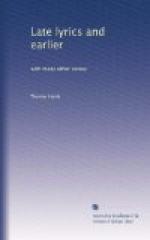THE PASSER-BY (L. H. RECALLS HER ROMANCE)
He used to pass, well-trimmed and brushed,
My window every day,
And when I smiled on him he blushed,
That youth, quite as a girl might; aye,
In the shyest way.
Thus often did he pass hereby,
That youth of bounding gait,
Until the one who blushed was I,
And he became, as here I sate,
My joy, my fate.
And now he passes by no more,
That youth I loved too true!
I grieve should he, as here of yore,
Pass elsewhere, seated in his view,
Some maiden new!
If such should be, alas for her!
He’ll make her feel him dear,
Become her daily comforter,
Then tire him of her beauteous gear,
And disappear!
“I was the midmost”
I was the midmost of my world
When first I frisked me free,
For though within its circuit gleamed
But a small company,
And I was immature, they seemed
To bend their looks on me.
She was the midmost of my world
When I went further forth,
And hence it was that, whether I turned
To south, east, west, or north,
Beams of an all-day Polestar burned
From that new axe of earth.
Where now is midmost in my world?
I trace it not at all:
No midmost shows it here, or there,
When wistful voices call
“We are fain! We are fain!” from
everywhere
On Earth’s bewildering ball!
A SOUND IN THE NIGHT (WOODSFORD CASTLE: 17-)
“What do I catch upon the night-wind, husband?
—
What is it sounds in this house so eerily?
It seems to be a woman’s voice: each little
while I hear it,
And it much troubles me!”
“’Tis but the eaves dripping down upon
the plinth-slopes:
Letting fancies worry thee!—sure ’tis
a foolish thing,
When we were on’y coupled half-an-hour before
the noontide,
And now it’s but evening.”
“Yet seems it still a woman’s voice outside
the castle, husband,
And ’tis cold to-night, and rain beats, and
this is a lonely place.
Didst thou fathom much of womankind in travel or adventure
Ere ever thou sawest my face?”
“It may be a tree, bride, that rubs his arms
acrosswise,
If it is not the eaves-drip upon the lower slopes,
Or the river at the bend, where it whirls about the
hatches
Like a creature that sighs and mopes.”
“Yet it still seems to me like the crying of
a woman,
And it saddens me much that so piteous a sound
On this my bridal night when I would get agone from
sorrow
Should so ghost-like wander round!”
“To satisfy thee, Love, I will strike the flint-and-steel,
then,
And set the rush-candle up, and undo the door,
And take the new horn-lantern that we bought upon
our journey,
And throw the light over the moor.”




